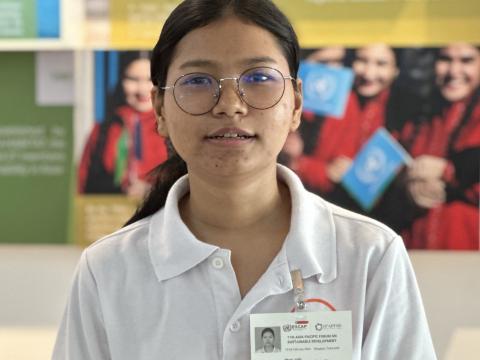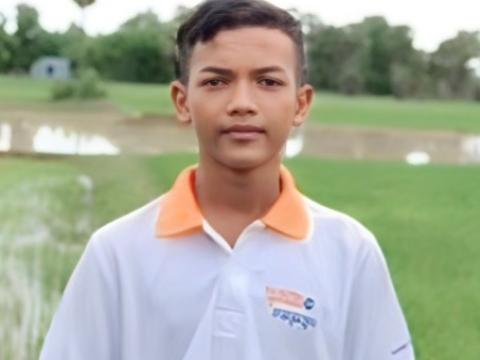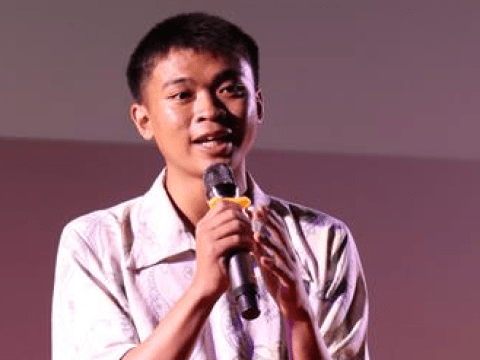World Vision is proud to be actively participating in the 11th Asia-Pacific Forum on Sustainable Development (APFSD) to support the follow-up and review of progress on the 2030 Agenda for Sustainable Development and the Sustainable Development Goals (SDGs) at the regional level. As a child-focused organisation committed to promoting the well-being of the most vulnerable children and communities, World Vision's presence at the APFSD underscores our dedication to addressing the pressing challenges facing children in the Asia Pacific and East Asia region in particular.
Firmly believing that the voices of children matter and need to be heard, World Vision is committed to ensuring inclusivity in our engagements with children, listening, hearing, and amplifying their voices on critical issues such as climate change, migration, food insecurity, and malnutrition. As part of this commitment to child participation, we have facilitated the participation of child representatives from diverse backgrounds in APFSD dialogues where they put forth their experiences, insights, and calls to action with policymakers and various stakeholders. These young advocates are voicing their concerns and recommendations, urging meaningful action to address the challenges affecting children in East Asia.
MEET OUR CHILD LEADERS AT APFSD11

Rima, 18, Cambodia - Leader of a child and youth club
With a profound belief in the transformative power of education, Rima advocates for its role in protecting the most vulnerable from harm and abuse, and promoting adaptability in the face of unstable climate change. She firmly asserts that education is the key to combating climate change and creating a more sustainable and resilient future for all.
Rima's recommendations:
- Integrate climate education into the school curriculum system so that it will help children to be aware of climate and environmental issues, change their mindset and behaviour, and spread knowledge about climate and environment prevention to their friends, family, and community people;
- Government and relevant stakeholders support youth to implement climate and environmental activities through financial, materials, ideas and other collaboration as much as they can;
- Increase engagement of youth to any national and international platform/ policy establishment especially related to climate and environment, listen and put into account their voice;
- Establish a platform that youth could join for learning and share what they see about climate issues, and suggest for supports their finding and innovation against climate change ( youth innovation hub financial support, and exchange learning visit);
- Local authorities and relevant departments actively support youth's climate action that works for climate awareness raising in their community.
"Climate change will affect food security and consequently lead to lack of nutritious food, reduced school attendance - especially among girls as their parents may consider prioritising their sons' education, early marriage, domestic violence and gender inequality. To avoid such negative impacts, inclusive climate change education is very important for children and young people because they will be the next generation capable of protecting the environment."

Narin, 18, Cambodia
Narin has actively participated in various community activities such as hygiene and sanitation promotion for parents with small children, food supplies support to vulnerable families, and cooking demonstration for parents to understand about nutritious food preparation to prevent child malnutrition.
“I will continue my voluntary work to help families in my community, especially those who are poor, vulnerable, and concerned about their food security children's health, so that they can live better with enough food to eat. I want to help my community and my country to ensure better nutrition for children.”

Seesavanh, 18, Laos
A youth from Northeastern Laos who has delivered multiple public sharing about how climate change has impacted food security in his community and pushed his former classmates out of school to help their families earn additional income to make ends meet.
My family depends on farming, but climate change brings droughts and floods, hurting our crops. Things worsened in 2018; our rice field, usually yielding 23 bags of rice, dropped to just 9. When times were tough, my dad had to gather bamboo shoots and cassava from the forest. My mom did her best, turning preserved vegetables into meals. Every day was a challenge, and meat became a luxury. It made me realise what we had was not enough.
In those tough times, it saddened me to see my brother give up his education, swapping books for bricks at construction sites to support us for a year. My parents had to sell our land to get him back to school. But not everyone was as lucky as my brother. I've seen girl classmates drop out at 14 for marriage or boys working to fight poverty.
I hope my story raises awareness that this issue should be ENOUGH and ENDED. Every child deserves complete nutrition and the right to survive, participate, and thrive. On behalf of all children in Laos, I leave you with this message: "You are our hope to help us build a healthier and better life."
Through their inspiring stories and passionate advocacy, our child representatives are calling for:
- Greater investment in education and healthcare access for all children, regardless of their circumstances;
- Stronger measures to protect children from the impacts of climate change and ensure their safety and well-being;
- Policies and initiatives that prioritise the needs of marginalised and vulnerable children, including those affected by migration and displacement
By amplifying the voices of children at APFSD, World Vision aims to foster a more inclusive and child-centred approach to sustainable development, where the concerns and aspirations of children are at the forefront of decision-making processes.
OUR SIDE EVENTS AT APFSD11
Side Event 1: Building a Greener Future: Education as Climate Solution
The world’s interconnected crises, from climate change to economic and food security, affect the well-being of children, denying them their basic rights. Estimates show that 244 million children will not set foot in a classroom this year, while 1 billion are at extremely high risk of suffering from the climate crisis, impacting their health and ability to learn. Strong education systems are essential to power the shift to safer, greener, more equitable and just societies. This APFSD Side Event will highlight new research on the impacts of the climate crisis, country progress, young people’s perspectives, and the power of multi-sectoral partnerships to innovatively address the impacts of climate on children through education.
Side event 2: End Child Hunger and Malnutrition in Asia and the Pacific
Together we can end child hunger and malnutrition in Asia and the Pacific. In collaboration with WFP, SUN Movement and UNICEF, this virtual side-event witnessed the soft-launching of World Vision's ENOUGH Campaign in Asia and the Pacific with an insightful dialogue between children and development actors.








